How many people are already using OpenAI’s ChatGPT or another generative artificial intelligence model at work?
That was the question Jeremy Mathurin, Microsoft’s director of solution engineering, asked a ballroom full of business leaders Sept. 23 at SWFL Inc.’s AI Summit breakfast at Plantation Golf & Country Club in Fort Myers.
Most of them — a regional sample of professionals from the tourism, medical, restaurant, tech, real estate development and other industries — raised their hands over plates full of breakfast buffet staples. Mathurin said that at similar group presentations a year or two ago only about 20% would have answered him affirmatively.
He joined AI industry experts Sean Maxwell, a research and computing technologist with Google, and Alejandro Castano, CEO and co-founder of the branding company Latinovation and an adjunct professor at Florida Gulf Coast University, at the regional Chamber of Commerce presentation.
They spoke about how AI is evolving as global companies and local institutions alike pour resources into utilizing the technology and offered insights into how AI is being developed by Google and Microsoft. Three years ago, Chat GPT was introduced, spurring widespread use and an increasing number of spinoff models that offer consumers an increasing number of options.

Sean Maxwell of Google presents at SWFL Inc.’s AI Summit in Fort Myers.
Google’s Maxwell suggested that the specific model matters less than finding ways to use the technology effectively for meaningful benefits.
“There’s an arms race of models,” he said. “Don’t get caught up in the models.”
But he also warned businesses: “If you’re not using AI, you probably won’t be here very long.”
The tech industry speakers urged the crowd to embrace AI — or else be left behind — while also offering the familiar warning to “keep a human in the loop” by monitoring and fact-checking AI systems without growing overconfident in AI’s abilities. Like people, AI has become known for producing factual errors, oversights or misleading conclusions.
Microsoft’s Mathurin pointed out that his company’s new AI companion is called Copilot, not Autopilot. It’s designed to work with people, not replace them.
Just like generative AI’s large language model transformed how people talk with AI, Mathurin believes that new AI “agents” will be the next step in that evolution. He described how agents will become comprehensive, proactive managers for individuals and businesses, responding to emails and phone calls, attending meetings on your behalf, analyzing spreadsheets and tending to a constellation of tasks that will free up peoples’ time.

Jeremy Mathurin of Microsoft speaks during SWFL Inc.’s AI Summit at Plantation Golf & Country Club in Fort Myers.
In developing such technology, privacy is a major concern that Microsoft and other companies are beginning to address. Mathurin said that Microsoft will not use information fed into its AI system to generate responses to train its own AI models.
Another next step in AI evolution includes the ability for nearly anyone to quickly create “virtual experts,” Maxwell said. “That’s the game changer. That’s the pivot. That’s where we’re going.”
A generative AI model, such as Google’s Gemini, can be verbally or manually fed data sources and used to create specialized experts — for example, on the legal requirements for opening a local restaurant.
During his talk, Maxwell used Gemini live to generate branding images and design a menu for a fusion Cuban fried chicken restaurant. He then asked the model to translate and read one of its responses in Spanish, Japanese and Haitian Creole, all of which it handled smoothly.
Maxwell stressed that feeding AI the best “current, clean” data when giving it a prompt is key to achieving good results.

Alejandro Castano of Latinovation addresses business leaders at the SWFL Inc. AI Summit.
In a Q&A session, an attendee asked Mathurin when technology might achieve general AI, the point at which machines behave indistinguishably from humans while matching or surpassing human intelligence. Mathurin said the timeline is uncertain, ranging anywhere from two years to a generation, and noted that the question is best left to philosophers and policy analysts.
“I’m a little scared but excited,” he said.
Castano suggested that if audience members left with just one insight, that would be to approach using AI tools with “purpose, vision and judgment.”

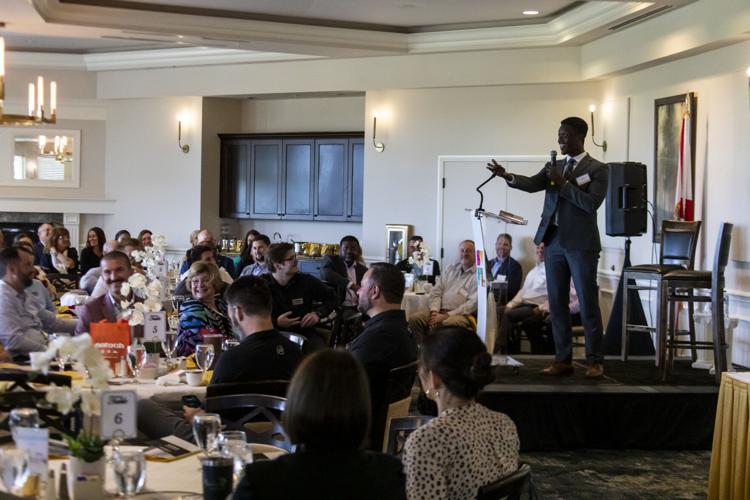

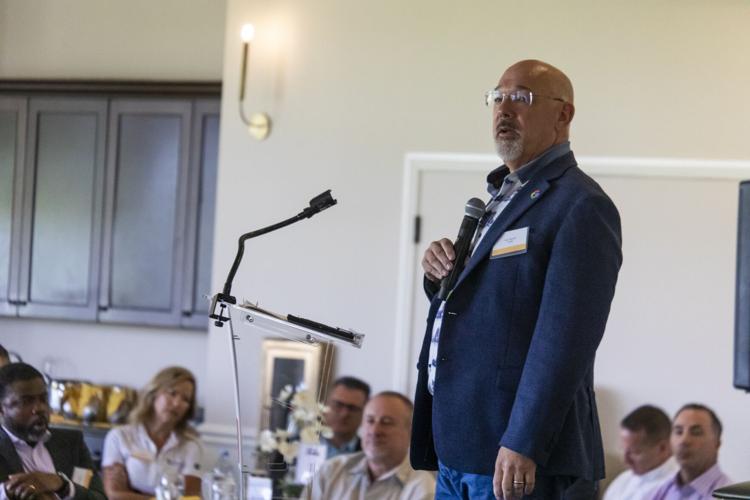
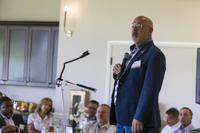

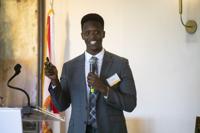

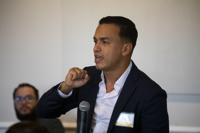
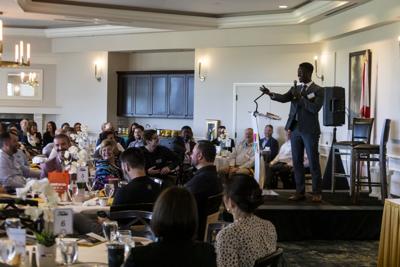
(0) comments
Welcome to the discussion.
Log In
Keep it Clean. Please avoid obscene, vulgar, lewd, racist or sexually-oriented language.
PLEASE TURN OFF YOUR CAPS LOCK.
Don't Threaten. Threats of harming another person will not be tolerated.
Be Truthful. Don't knowingly lie about anyone or anything.
Be Nice. No racism, sexism or any sort of -ism that is degrading to another person.
Be Proactive. Use the 'Report' link on each comment to let us know of abusive posts.
Share with Us. We'd love to hear eyewitness accounts, the history behind an article.